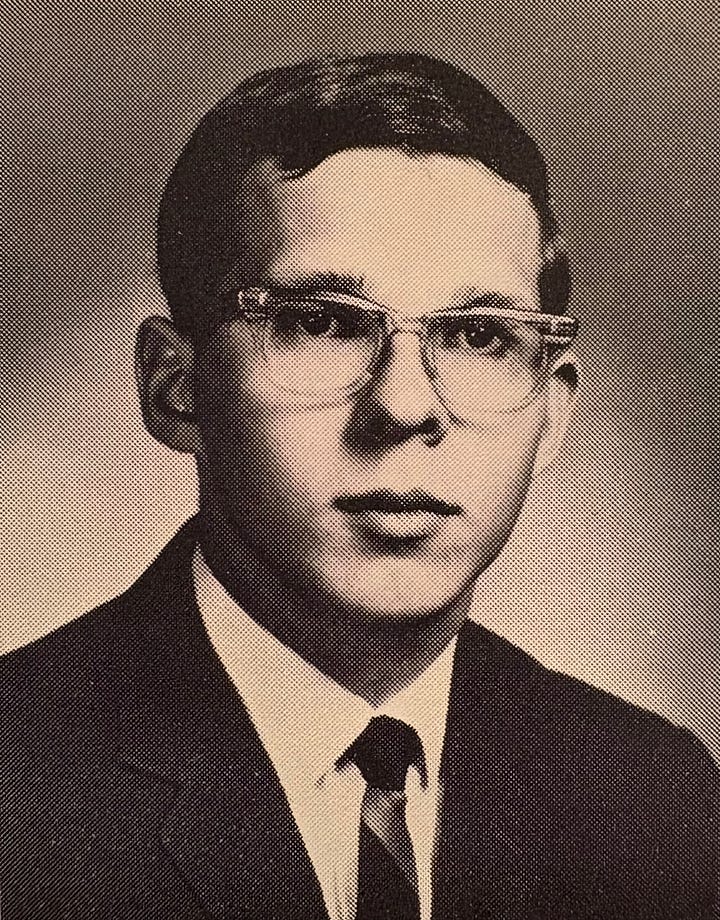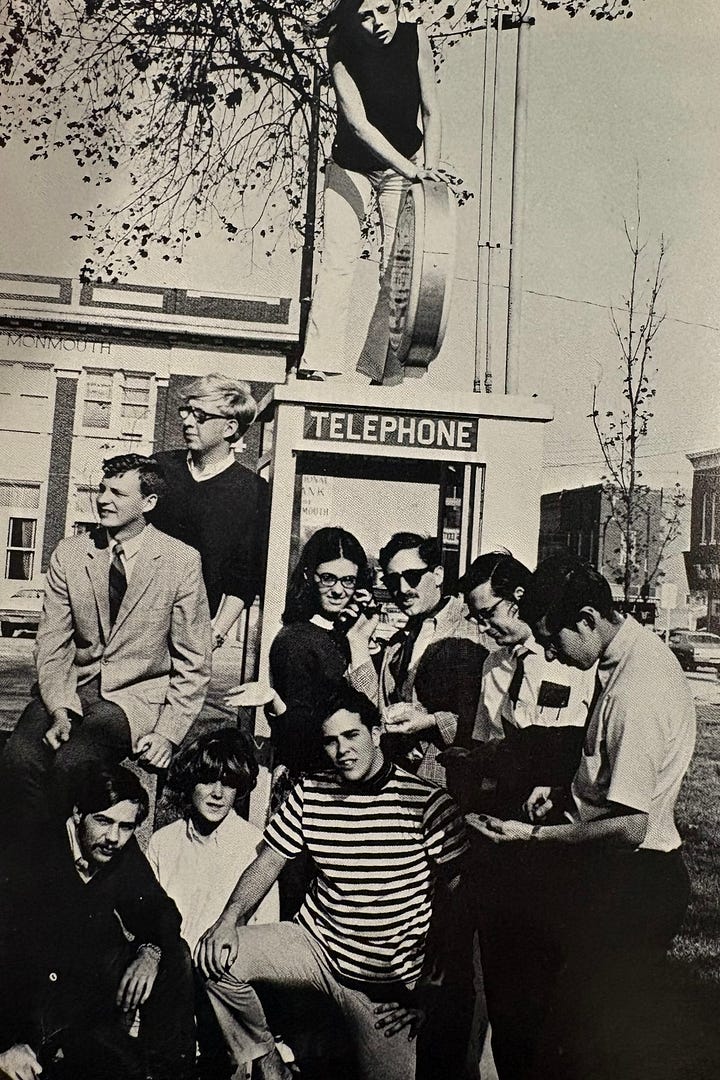Decades of dedication as a college professor: Dr. Lee McGaan
Izzy Gimm, Seamus O’Sullivan, Ryan Phillips, Mackenzie Yarc


After decades of teaching, mentoring, and leadership, Dr. Lee McGaan is a former student, professor, and chair of the Communication Studies Department at Monmouth College. His dedication over the years reflects his passion for communication and inspires the impact he hopes to have had on his students during his time.
“By the time I was ready to go to college, I came here,” McGaan said.
Many of McGaan’s family members had attended Monmouth College, prompting his passion for the College before he stepped foot on campus.
“My great uncle came here, then my mother, and then my older brother came here… my older sister came here,” McGaan said.
He took many classes at Monmouth, beginning as a political science major but taking most of his courses in Economics and Communication.
“I mostly took classes that I liked from mostly people I wanted to take classes from driven by faculty rather than by the idea of the class,” McGaan said. “I liked the chair of the communication department a lot, so I took things from him. I liked a guy in the Econ department, so I took lots of stuff from him, and I liked a guy in the psychology department, so I took classes from him.”
McGaan graduated from Monmouth and pursued a Fellowship and Master’s degree in organizational communication from Ohio University. Unfortunately, his time in the program was cut short.
“I won the draft lottery,” McGaan said. “So, after my first year of graduate school, I went to the army. It turned out as disappointed and frustrated as I was, and I ended up losing my fellowship because of that.”
After the military, he returned to his roots and taught at Monmouth College. He took his military organizational communication experience and relayed his lessons to his students in the classroom and through his actions in faculty organizations.
“I think, in general, I tried to promote the idea that we should be more open with people about what was going on and why at the college. That’s why I joined the faculty budget committee,” said McGaan. “There's a lot of unhappiness in that most people don't get what they want because there are a lot of requests and a limited amount of money. One of the things that I tried to do as much as I could was be open and make sure people understood the whole process; this was something I took from my time in the military. When I worked on that committee, I think things were more open than they had been before.”
Under his guidance, the Communication Studies department grew from a joint department with the theater major. Aside from impacting student lives, this accolade was one of McGaan’s most significant accomplishments. He sought to listen to and understand students, their circumstances, and their thoughts on how he could improve his classroom.
“I always tried to listen and I felt a need to make sure the student knew that I heard what they said and would talk to other people about it, depending on the concern,” said McGaan. “I think most of the improvements I made in my classes over the years were driven by ideas that students gave me about how I could improve things. There was an impact there, and also an impact with students in the sense that I was able to recognize when students were good at communication even in the intro level classes.”
McGaan mentioned multiple instances where students excelled in his courses and recommended that they pursue a communication major.
Former Monmouth College communication studies student and current Communication Professor Ethan Hager can attest to McGaan’s passion for mentorship and teaching.
“One of the first conversations I had with McGaan was while I was in his (Comm 101 (introduction to oral communication) class. It was at the beginning of the semester, and I asked him what to expect out of the class, but he asked me some questions that made me think more about my future,” said Hager. “It really got me thinking and motivated me to do well in his class. That first conversation set the tone for the rest of my experience here at Monmouth and prompted me to be a part of the communication department.” McGaan had a passionate way of teaching and an infectious personality. “His level of knowledge and his natural charisma set him apart from other professors. He was a very easy to listen to kind of person,” said Hager.
According to Hager, his passion for organizational communication was portrayed through his curriculum.
“In Public Speaking, he emphasized the importance of organization in a formal speech,” said Hager, “He always broke a speech down into its subcomponents and explained why each was important. The importance of organization in a speech is something that a lot of students miss. Focusing on that helps students get a good headstart on their own projects in my class. That first foundational moment of explaining that to students is something that stuck with me from McGaan’s classes, and it's something that I like to emphasize in my classes as a professor, as well.”
McGaan was able to impact many students over his decades at Monmouth. “McGaan's kind of an old guard; he was at Monmouth for a long time, and he's had a massive impact on hundreds of students. Alumni have had the opportunity to share in some of his storytelling as well as his personable spirit, which I know so many of us remember beyond his teaching. It really is beautiful,” said Hager.
Under his guidance, the Communication Studies department fostered an environment where collaboration thrived among faculty and students alike. McGaan designed courses that balanced theory with practical application, ensuring students were equipped with both knowledge and skills. He taught at Monmouth College for 31 years before handing the department chair role to Dr. Trudi Peterson.
“Before I came, Lee was instrumental in creating the journalism minor,” Peterson said. “His most significant contributions were in strengthening department curriculum and devising an assessment plan for the department."
McGaan thought that experience outside of the classroom was essential to success in undergraduate studies.
“Given the fact that I had this connection with organizational communication, there is that requirement students must follow, which is to graduate from the college with an internship.”
“He was committed to the liberal arts and insisted that department learning objectives reflect the overarching mission of the college,” Peterson said.
Monmouth College said goodbye to McGaan in 2017 when he retired.
“My motto is if a person has a complaint, even if I think it's crazy, are you kidding me? Doesn't matter. I need to listen, and I need to make sure the person knows that I heard what they said and I talked to other people about it, depending on what the concern was,” McGaan said.

